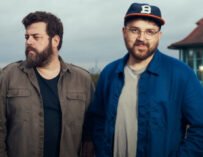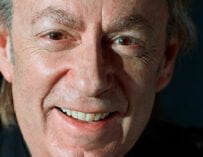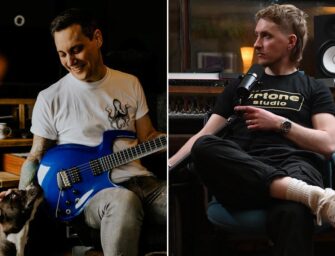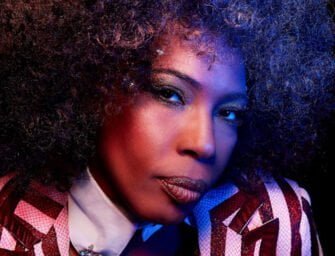
Henry: “Anything that excites us or makes us feel something out of the ordinary usually leads to us getting the guitars out.”
We chat to brothers Henry and Rupert Stansall about their debut album and working with the legendary producer Rick Rubin
Anyone who heard the Ruen Brothers twangy Orbison-inspired 2013 single Aces will have been eagerly awaiting their debut album ever since. Thankfully that wait is finally over with the release of All My Shades Of Blue last month. Helping Henry and Rupert Stansall create the record were a host of familiar names. Producer Rick Rubin, Chad Smith of the Red Hot Chili Peppers, The Killers’ Dave Keuning and the late great Ian McLagan all feature on an album which delivers on that early promise.
That two brothers from Scunthorpe have ended up in such lofty company speaks volumes about the strength of their songwriting. All My Shades Of Blue is an album which pays tribute to its influences while sounding fresh and modern. It’s clear that the relationship between Henry and Rupert is one that is capable of creating memorable music.
We recently caught up with them to discuss how the album came together and the role of their famous friends…
From the outside it feels like this album has been a long time coming – is that a feeling you also share?
Henry Stansall: “It has been a long time coming. We’ve been very busy since writing and recording the songs on All My Shades Of Blue. We moved from London to Los Angeles to New York, releasing a few of the tracks as part of an EP along the way, and also writing another album since. It feels like good timing for us.”
Was it a deliberate decision to take your time to ensure you created the debut you wanted to make?
Rupert Stansall: “Yes. Fortunately, we’ve been lucky to get the songs to a place where we wouldn’t want to change a note. From the writing through to the mixing, mastering and artwork, there’s been no rush. Everything you hear is how we intended it to be, with added direction from some great people.”
When did the songs first start taking shape?
H: “Strangers is the earliest song we wrote for the album. We wrote it in 2010 or 2011. It initially had different lyrics but the chords and melody channelled us towards a style in which we began writing more. Following that was Aces which, despite the majority of it being written within 30 minutes in 2012, wasn’t finalised for a few months.”
R: “We first met Rick Rubin with around twenty songs we thought were good and stylistically on point, but after going through the songs at Rick’s studio, we reduced that number to five. It was clear what we collectively liked about those five songs and knew the process to write more of the same quality. We wrote new material rapidly and after a few weeks back in England, the rest came together.”
Do you have a set writing process?
H: “We listen to a huge range of music. We either get inspired by songs we’re listening to or a great film sets us off. Anything that excites us or makes us feel something out of the ordinary usually leads to us getting the guitars out and playing/singing through some ideas.”
R: “The basis of our songs develops fairly quickly. Chords and melody often come together first, along with vowel sounds. Then, we develop lyrics. We tend to cast off anything too indulgent initially, aiming for a couple of really catchy or interesting sections. If we end up with what we think is a good chorus, we’ll see if that can be a verse and aim higher and better for a chorus. Then the moulding and shaping happens.”
H: “Ru was classically trained so that helps when tying the sections together and refining – which often takes some good theory knowledge. It also helps knowing what chord structures and melodies associate with different musical genres, in case we want to lean a song into a certain style or give it a certain flavour. Regarding lyrics, we tend to work around the rhyme schemes and vowel sounds we initially hum to keep the excitement of the original idea. We also begin recording the ideas soon after coming up with them which enables us to stick sections on loop whilst thinking on lyrics and refining parts.”
How often do you disagree about the direction/content/sound of a song? Is it a diplomatic relationship or a brutally honest one?
R: “It’s pretty brutally honest but never offensive. It’s very rare for one of us to like an idea and the other not. We’ve grown up around the same music and it’s great to have a bounce board. We trust each other so it’s a very harmonious writing relationship. We’ll show our ideas to each other first before anyone else. Writing can be very personal and inviting to criticism, yet it doesn’t feel like we’re putting our necks on the line when we’re sharing our ideas with each other.”
There’s a timeless feel to much of All My Shades Of Blue, how much of that is down to your early influences?
H: “Thank you. The title track came around one evening in Nashville, 2014. To be in the same town that The Everly Brothers, Roy Orbison and Elvis Presley, amongst others, recorded in must have had some effect on us. We had checked out the Johnny Cash museum whilst in town and had a tour of RCA’s Studio B. We had been covering songs by those artists since we began playing and they were the reason we got hired in the pubs of Northern England as young teenagers.”
R: “Playing those kinds of songs week in, week out rubbed off on our songwriting. We wrote daily throughout our teens and absorbed what we played, over time figuring out why all the chords and melodies engaged us and the pub punters alike. We also couldn’t help being influenced by modern artists on the radio. With the album, we wrote true to us and we believe it funnels our appreciation for a multitude of genres and artists from a songwriting and production perspective.”
At what point did Rick Rubin become involved?
H: “At the beginning of 2014. Rick had heard some of our music via an old manager and then our previous A&R guy. It was around 10 months after he initially heard about us that we got together at his home and talked music. Ten days after this meeting we commenced work together on the album.”

Ru: “With great musicians and ideas brought to the table constantly, each take was exciting.”
Did he have any advice with regards to the songwriting?
R: “When narrowing our songs down to the best album’s worth of material, often songs that required much change, or didn’t have enough favourable parts wouldn’t make the cut. Some songs were taken in their entirety and some changed very little. In the initial, ‘Let’s sit down with acoustic guitars,’ stage, Rick would say what he liked in each of our songs, what could be changed, added and taken away. He would say things like, ‘Maybe change that bit of melody there,’ or, ‘I feel like at the end you could try going higher,’ as well as lyrical suggestions and key changes. Things would also change structurally. We now try to look at our songs objectively, either whilst we’re writing them or afterwards, with a similar approach.”
H: “And as Rick always advises…’keep writing.’”
You have some other big names appear on the album – was that Rick’s influence?
H: “It was mostly Rick’s influence, bringing the core tracking band of Chad Smith, Matt Sweeney and Jason Lader. They really understood our direction and the feel of the songs. We mentioned to Rick about involving Ian McLagan and Dave Keuning. Rick reached out to Ian and asked if he’d kindly lend his talents to the record and Ian flew out the following week and laid down keys on a few of the songs. We really wanted that cool honky-tonk vibe which worked for songs like Motor City and Aces. We’d met Dave months prior when we were doing some writing together in San Diego. He mentioned to us that he could play cello and if we ever needed any, to give him a shout. That moment came when we wanted some cello on the title track.”
Was it easy to stay true to your vision and maintain focus with so many successful musicians in the room with you?
R: “We were at ease after a short time. They were playing with us not because of their name but because of their talent and that really helped put our minds to rest – we knew everything was going to turn out okay… well, great. With great musicians and ideas brought to the table constantly, each take was exciting. I think that was captured in the recording. We were very grateful that they appreciated our songwriting, playing and singing as we appreciated theirs.”
Of course special mention has to go the late Ian McLagan. What memories do you have of working with him?
H: “He was a lovely guy. The Small Faces and Faces were a couple of our favourite bands growing up. We would cover their songs in the pubs from a young age. Mac looked like a rock star from the off and could tell amazing stories endlessly. He brought some magic to songs such as Motor City.”
R: “It was an honour to record with him. Unfortunately, he didn’t get to hear how the record finished up.”
Was it important to use the right gear when recording?
R: “Yes. We were using some of the best gear available, partly to get the best sound and partly to enable us to find any sound we were looking for. I believe we were often using AMS Neve 1073 preamps for the vocals, 1176, LA-2A compressors on vocals and LA-3A’s on guitars. U64 mics as well as a bunch of others. We were recording into Protools using a vintage API console as a bus mixer. The gear gave a beautiful representation of what we were playing and singing, which was encouraging from the tracking stages onwards. We used a lot of Gibson acoustic guitars on the record as well as a vintage Fender Esquire guitar, some Gretsch’s and Supro and Vox amps mostly. Particularly with guitars and amps, stylistically they can inject a certain vibe – Americana, rock, country. There was a lot to choose from.”
What would you say are the key components of a successful Ruen Brothers song?
R: “Emotion, excitement and dynamics. We like hooks, but in our view a hook isn’t necessarily a singular repeated vocal part or imposed catchiness. It’s the emotional draw that holds us. It can be emphasised by lyrics but is usually the relationship between the melody and chords. We believe it must come from people’s primal instincts, when language was lesser developed and sounds alone could mean life or death – with chords perhaps implying a group. Any excitement we feel when writing is usually represented in that basic form, without need for lyrics until later. We like to make the listener feel a range of emotions.
“With songs such as Aces we added an additional flattened 7th extension to the tonic chord for the verses, emphasised by the guitar riff. It adds a light-hearted feel to it – kind of like I Saw Her Standing There from The Beatles’ Please Please Me album. We wanted to keep it light-hearted until the entrance to the bridge when we stick a major third in the mediant chord along with a minor 7th extension to create some tension and unease. We then put a minor third in the subdominant chord for some traditional 60s sadness, just before releasing to the more dramatic open chorus, which includes the dominant 7th chord, not yet introduced; it feels like a relief at that point.”
H: “When writing Aces we had just watched a great documentary about Harry Nilsson. We tailor our ideas, but it all comes from excitement and emotion. That’s how everything starts.”
Lastly, how do you feel now that album is out? Are you desperate to move on to the next one or happy to be playing these songs for a good while yet?
R: “Happy to be playing them for a while! Some of them we’d never gigged prior to a few weeks ago. We wanted to keep some as a surprise for fans – anyone can record shows on phones and share on social media prior to releases and we didn’t fancy that. From our early pub-gigging days, we’ve grown a high tolerance for playing the same songs week in week out. There’s always new things to find in songs when playing live, so we have fun with the ones that are released at the moment and will do for a long while. On the flip side, we’re excited to record the new stuff we’ve written and get it out there.”
H: “It’s a nice time to be in, we get to focus on new stuff at home and in the studio and gig the familiar stuff.”
Interview: Duncan Haskell
All My Shades Of Blue is out now. For all the latest news, head to ruenbrothers.com


































Related Articles